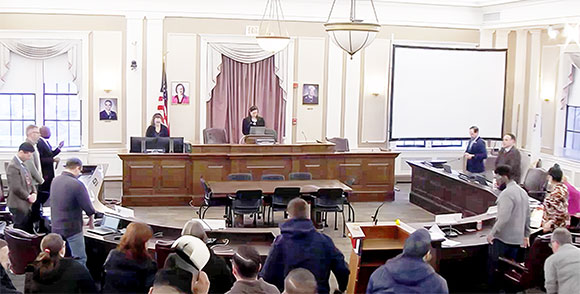
The Somerville City Council voted against increases in salaries for council members, the mayor, and school committee members.
By Jeffrey Shwom
The City Council voted not to approve an automatic increase in city council, the mayor’s, and school committee members’ salaries at its latest regular meeting on Thursday, April 10. After much discussion and two public versions of the ordinance, the council had a majority at six votes to five, but they needed eight votes to pass.
The ordinance, sponsored by Councilor Ewen-Campen and supported by the Finance Committee members, would have become effective January 1, 2026, after this year’s municipal election cycle.
The first draft had suggested an automatic increase every year tied to the annual cost-of-living percentage adjustment (COLA) received by non-union city personnel. As mentioned by the Times previously, there was a perception the recommendations of the five-person board and city personnel department would be being overridden by the council.
Upon review of the first draft, city spokesperson Grace Munns said, “The city has not opposed the concept of COLAs, in fact, other municipalities such as Cambridge and Northampton have implemented them, and we are open to exploring the idea.” However, the city raised issues regarding the structure and language. “The challenge is in the how, not the what. Somerville doesn’t have a history of using a COLA model for elected officials” and has relied on the MCAB recommendation process. That process, last held in 2017 though it is supposed to occur every other year, allowed for a 60% pay increase (from $25,000 to $40,000).
On April 8, the finance committee recommended approval of the compromise second version that outlined if and when city councilors, the mayor and school committee members receive an automatically yearly pay increase.
The newest language asked for compensation to increase by a maximum of two percent or the annual average consumer price index increase for the Boston and north of Boston metro area, whichever figure is lower. The catch was that when the Municipal Compensation Advisory Board issues a recommendation, their findings supersede the automatic increases.
For example, if the ordinance was in practice this year, there would be no automatic salary increases because in January 2025, MCAB recommended no changes, citing above-average pay for those civil servants compared to adjacent towns and cities. Finance Chair Jake Wilson remarked during the meeting, “I believe we have figured out a way to do cost of living adjustments for electeds while solving for the conflict of interest…and the MCAB recommendation issues.”
Since the first draft, the authors of the ordinance worked to make it more clear they were not trying to directly give themselves a raise. Brendan Salisbury, Legislative and Policy Analyst for the city who helped with the draft, suggested using January 1 of the preceding year for the salary increases, so that the increase would be “a year behind” and would avoid the perception that councilors were giving themselves raises.”
The finance committee agreed. Councilor Wilson said, “We did not want to chain it to anything that we would have (direct) input on.” Furthermore, the councilors could vote to waive a pay increase by a two-thirds vote. Salisbury said, “If it was going to be a particularly lean year ahead, the council could know well in advance” whether or not to allow or waive the next increase.
Not all the councilors were satisfied. Councilor J.T. Scott motioned to change two percent to be four percent before withdrawing. “I think we are doing a lot of gymnastics that really are not necessary. I did want to point out that the standard pay increase for the entire time I have been on council for non-union personnel is 4%. In some rare cases, there was a 2% year…even in our catastrophic Covid year, when some raises were delayed, the city was able to give non-union employees their pay raise.”
Councilor Clingan also said that he thought the new language seemed “overly complicated. I have been a proponent of just tying it to Social Security COLA, which happens in October each year,” giving the city time to plan for its budget. And Councilor Burnley expressed that he still does not think this language fixes “the historic gap” in pay. “It is supplemental without solving the root issue” of councilors not getting paid enough.
Even so, Councilor Ewen-Campen, who sponsored this ordinance, emailed, “The last time the Municipal Compensation Advisory Board made a recommendation on the salaries of elected officials in Somerville was nine years ago. These salaries have been frozen since then. There are no other jobs in Somerville that have not seen a pay raise in a decade. The cost of living in Somerville increases every year, and if pay doesn’t increase, it’s basically giving people a pay cut every year. I think it’s a matter of basic fairness that public servants should see a modest cost of living increase each year.”














